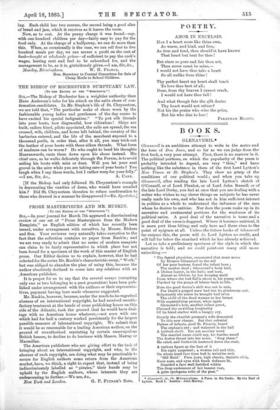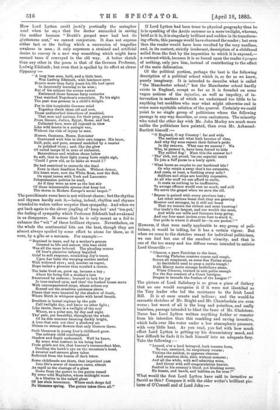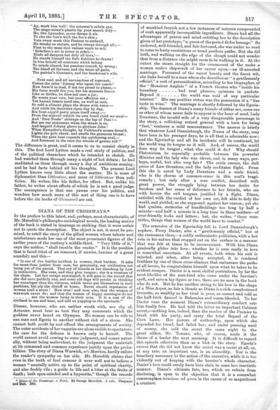BOOKS.
GLENAVE RIL.*
Glenaveril is an ambitious attempt to write in the metre and the tone of Don Yuan, and so far as we can judge from the first book, a very poor attempt. First, there is no marrow in it. The political portions, on which the popularity of the poem is probably intended to depend, are very " thin," and have nothing like the sabstance in them of the first Lord Lytton's New Timon or St. Stephen's. They show no grasp of the conditions of our political world ; and when you take up Glenaveril, after reading the late Lord Lytton's sketch of O'Connell, or of Lord Plunket, or of Lord John Russell, or of the late Lord Derby, you feel at once that you are dealing with a writer who wishes to say clever things on subjects he has never really made his own, and who has not in him sufficient interest in politics as a whole to understand the influence of the men whom he desires to satirise. Nor does the poem make up in its narrative and sentimental portions for the weakness of its political satire. A good deal of the narrative is tame and a good deal of the verse is doggerel. Where it becomes satirical, it is more pert than biting, and only here and there rises to the point of epigram at all. Unless the future books of (Glenaveril far surpass this, the poem will do Lord Lytton no credit, and will fall far below the standard which he has already achieved.
Let us take a preliminary specimen of the style in which the narrative is told ; and we could point-out many still more uninviting :—
" The famed physician, summoned that same morn
By Eleanor Glenaveril to the aid Of her poor hostess, found the infant born ; The mother dead ; Glenaveril's body laid, A lifeless horror, in the hall; and torn, Almost as lifeless, by her weeping maid
From where she had fall'n above it, his young wife,
Plucked by the pangs of labour back, to life.
Here the good doctor's skill was not in vain, For Death's gorged maw had lost its gluttonous zest.
Reluctantly the nurse he brought had ta'en The child of the dead woman to her breast With superstitious protest, when again Glenaveril's heir, another infant guest, Claimed the unwilling hospitality Of its hired shelter with a hungry cry.
Stoutly the churlish peasant's wife demurred To this new charge. But that celestial Patron of infants, good St. Francis, heard The orphan's cry ; and wakened in the hall A hubbub shrill. Ere yet another word The startled nurse could say, his burden small The dootor thrust into her arms. ' Stay there !' He cried, and forthwith hastened down the stair.
-A curious figure at the foot of it His eight surprised ; a woman tall and thin, On whose bard face time had in wrinkles writ ' Old Maid.' Firm jaws, high cheeks, decisive chin, Keen nose, and eyes with frank defiance lit,
Guarded a face well fortified within
The deep embrasure of her bonnet vast,
A grim cyclopean relic of the past."
How Lord Lytton could justify poetically the metaphor used when he says that the doctor succeeded in saving the mother because " Death's gorged maw had lost its gluttonous zest," we cannot conjecture. It does not express either fact or the feeling which a succession of tragedies awakens in man ; it only expresses a strained and artificial desire to convey in a new way something which might have seemed tame if conveyed in the old way. A better sketch than any other in the poem is that of the German Professor, Ludwig Edelrath ; but even that is spoiled by its effort at clever flippancy :—
"A long lean man, bald, and a little bent,
Was Ludwig Edelrath, with luminous eyes.
Scarce more than forty years his life had spent In innocently learning to be wise ; But of his science the serene extent Embraced those famous forty centuries That watched Napoleon's conscripts. To his sight The past was present in a child's delight.
For in this hospitable German mind Together dwelt ideas old and new, Those undisturbed disturbers of mankind, That men and nations, for their prey, pursue From Greece, Jams., Egypt, Rome, and Lid, Collected here, were all exposed to view Like wild beasts in a zoologic van, Without the risk of injury to man.
Homer, Gantama, Moses, Zorotister Conversed with him in their own tongue. His brow, Bald, pale, and pure, seemed modelled by a master In polished ivory; and, like the glow Of veiled lamps lit in urns of alabaster, Benevolence and wisdom shone below So soft, that in their light young Love might sigh, 'Could I grow old, as he looks so would I He had contrived to reconcile the dead Even in their deadliest feuds. Without demur, His heart wore, now the White Rose, now the Red, On equal terms with York and Lancaster. Peloponnesian politics he read, As if they were as new as the last stir Of those innumerable spoons that keep hot The storm in Modern Europe's social teapot."
The penultimate verse here is not without charm ; but the rhythm and rhymes hardly suit it,—being, indeed, rhythm and rhymes intended to waken rather surprise than sympathy. And when we get back again to the clever jingling of ' keep hot' and tea-pot,' the feeling of sympathy which Professor Edelrath had awakened in us disappears. It seems that he is only meant as a foil to enhance the " wit " of these brilliant rhymes. Nevertheless, on the whole the sentimental bits are the best, though they are almost always spoiled by some effort to atone for them, as it were, by a gibe or a sarcasm. For example :
" Baptised in tears, and by a mother's groans
Greeted to life and sorrow, this lone child Was all the more beloved. The pleading moans Of Ivor's plaintive infancy beguiled Grief to soft response, mimicking Joy's tones.
Upon her babe the weeping mother smiled With widowed eyes; and, sombre as regret, Hope hailed a promise that recalled a threat.
The babe lived on, grew up, became a boy ; About his being felt a mother's love Sweetened by sadness ; learned to look for joy In tear-stained eyes, and thro' the hushed house move With uncompanioned steps, whose echoes coy Scared not the sensitive quietness above Floors that were haunted by the shadow of death, Where Mirth in whispers spake with bated breath.
Dwellers in boreal regions by the pole Call twilight day, and know no other light ; Like theirs, there is a twilight of the soul Where, as a polar sun, by day and night Tho' pale, yet beautiful, throughout the wholo Of its dim summer beaming darkly bright, A love that sets not thro' a shadowy air Shines on strange flowers that only blossom there.
Such blossoms in young Ivor's childhood grew.
The solitary child contemplated Shadow and depth undaunted. Well he knew, By some wise instinct in his being bred From griefs not his, that heaven's transcendent blue, Dazzling the hawk's eye on the mountain's head, A sweeter and serener glory takes Reflected from the bosom of dark lakes.
Some childhoods are there, that impatient pass Into life's sewer of common cares, almost As rapid as the rinsings of a glass Down from the garret to the gutter tossed By some wild Magdalen, whose midnight mass Is a libation to the unlaid ghost
Of her slain innocence. Where each drops fall No blossoms spring. The gutter takes them all." If Lord Lytton had been truer to physical geography than he is in speaking of the Arctic summer as a mere twilight, whereas, brief as it is, it is singularly brilliant and sudden in its transform
ing effects, this passage would have charmed the reader; but even then the reader would have been revolted by the very needless, and, in its context, strictly irrelevant, description of a childhood soiled from the first by the impurities to which it is exposed,— a contrast which, because it is so forced upon the reader a propos
of nothing, only jars him, instead of contributing to the effect of the main delineation.
Of the political portion, perhaps the beat is the following description of a political school which is, so far as we know, purely imaginary. It is intended to describe what is called " the Manchester school ;" but the Manchester school hardly exists in England, except so far as it is founded on some vague notions of the injustice, as well as impolicy, of in tervention in matters of which we underkand too little to be anything but meddlers who mar what might otherwise end in some more equitable solution of the quarrel. Certainly we could point to no single group of politicians whom the following passage in any way describes, or even caricatures. The minority who voted the other day with Mr. John Morley are much more unlike the politicians here painted, than even Mr. AshmeadBartlett himself :—
"0 England, 0 my Country ! far and wide The nations ask what hath become of thee, And why thy sons repent their father's pride In thy renown. What can we answer ? We Who, to protect it, have been forced to hide Thy sullied flag! Mast this the answer be ? Tho' rich, not proud, 'tis our especial merit To join a falfpurse to a lowly spirit.
`What boots an empire to our burdened isle ?
Or why retain a sway that's too extensive, And costs, at least, a farthing every mile ?
Soldiers and ships are horribly expensive. At all who scoff we can afford to smile, It costs us nothing to be inoffensive, To avenge offence would cost ns much, and still We serve the gospel when we save the till.
Repose is gained with every province lost ; Let other nations boast that they are growing Greater and stronger, be it still our boast That we remain the richest and most knowing! Onr trade's the largest, and our wealth the most, And while our mills and furnaces keep going, And our free mart invites even foes to stock it, Our pride is where it should be—in our pocket !'"
However, if that were really applicable to any group of politicians, it would be telling, for it has a certain vigour. But when we come to the sketches meant for individual politicians, we can find but one of the smallest vivacity, and that is one of the too many and too diffuse verses intended to satirise Lord Granville :
" Glances, a pure Patrician to the bone,
Serving Plebeian masters coarse and rough, Seems all misplaced, as some fine Parian stone At Smithfield used to prop a cattle-trough ! Doth Misery make strange bedfellows alone, When Glaucus, trained in arts polite enough For the fine conduct of a Court Intrigue, Drapes in brocade the fustian of the League ?"
The picture of Lord Salisbury is so gross a piece of flattery that no one would recognise it if it were not identified as the Tory leader who led the resistance to the Irish Land Bill. It is at once ornate and tedious ; and the would-be sarcastic sketches of Mr. Bright and Mr. Chamberlain are even worse ; but worst of all is the long and pointless, and really brainless, passage intended to blast the fame of Mr. Gladstone. Never has Lord Lytton written anything feebler or remoter from his intention than this rambling and raving invective, which boils over like water under a low atmospheric pressure, with very little heat. As you read, you feel with how much effort Lord Lytton is getting-up his denunciatory mood, and how difficult he finds it to lash himself into an adequate fury. Take the following :
"Loosed, o'er a land betrayed, hath treason-been,
To run, unreined, its sanguinary coarse; Victims the noblest, to appease obscene And senseless idols, slain without remorse ; And all the while, with self-admiring mien,
And throat with self-congratulation hoarse, Soaked in his country's blood, yet blushing never, He boasts, and bawls, and babbles on for ever !"
What would the first Lord Lytton have said to invective so flaccid as this? Compare it with the elder writer's brilliant pictures of O'Connell and of Lord John :—
" Ay, mark him well ! the schemer's subtle eye,
The stage-mime's plastic lip your search defy—
He, like Lysander, never deems it sin To eke the lion's with the fox's akin ; Vain every mesh this Proteus to enthrall, He breaks no statute, and be creeps through all ;— First to the mess that valiant truth to tell, 'Rebellion's art is never to rebel,—
Elude all dangers bat defy all laws,'—
He stands himself the Safe Sublime he draws!
In him behold all contrasts which belong To minds abased, but passions roused, by wrong ; The blood all fervour, and the brain all guile,
The patriot's bluntness, and the bondsman's wile.
Next cool, and all unconscious of reproach, Comes the calm 'Johnny who upset the coach.'
How form'd to lead, if not too proud to please,—
His fame would fire you, but his manners freeze.
Like or dislike, he does not care a jot; He wants your vote, bat your affection not ; Yet human hearts need sun, as well as oats,
So cold a climate plays the deuce with votes.—
And while his doctrines ripen day by day, His frost-nipp'd party pines itself away ;
From the starved wretch its own loved child we steal—
And 'Free Trade' chirrups on the lap of Peel !
But see our statesman when the steam is on, And languid Johnny glows to glorious John !
When Hampden's thought, by Falkland's muses dress'd, Lights the pale cheek, and swells the generous breast ;
When the pent heat expands the quickening soul,—
And foremost in the race the wheels of genius roll !"
The difference is great, and it seems to us to consist chiefly in this. The first Lord Lytton made a real study of politics, and of the political characters which he intended to sketch. He had watched them through many a night of hot debate ; he had meditated on them through many a day of ambitious musing ; and he had facts behind all his thoughts. The present Lord Lytton knows very little about the matter. He is more of diplomatist than litterateur, and more of liteerateur than politician. He writes, like his father, for effect. But, unlike his father, he writes about effects of which he is not a good judge. The consequence is that one yawns over his politics, and wonders how much more of this sort of thing one is to have before the six books of Glenaveril are out.




































 Previous page
Previous page